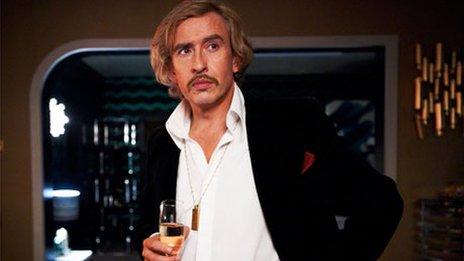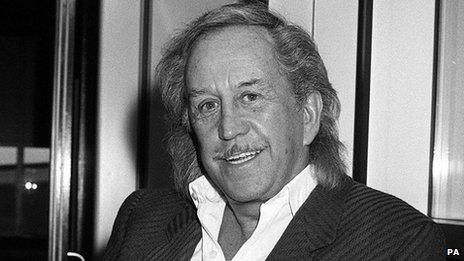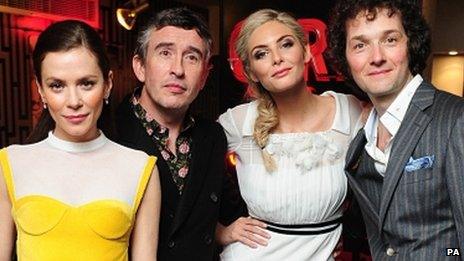Remembering the King of Soho
- Published

Steve Coogan focused on Paul Raymond's relationship with women
The Look of Love, a film starring Steve Coogan as London porn baron Paul Raymond, reveals how he made a vast fortune out of two things - sex and property - and depicts both his heyday and his decline.
From the late 1950s his Raymond Revuebar offered London full-frontal nudity while magazines he owned such as Men Only flourished too. But the big money came from owning large swaths of Soho.
It is only five years since he died but Paul Raymond (born Geoffrey Quinn in 1925 in Liverpool) was already a slightly forgotten figure until Steve Coogan persuaded director Michael Winterbottom he would be a good subject for a very British biopic.
Winterbottom had already worked with Coogan on 24 Hour Party People, A Cock and Bull Story and the BBC series The Trip.
"The reason I thought Raymond was worth making a film about was because he lived in an era of great change," says Coogan.
Husband and father
"It's a matter of opinion whether he was selling titillation or pornography or burlesque.
"But he existed at a social crossroads in how we deal with sex and sexuality in Britain. He didn't create that change but he became a lightning rod for people protesting about indecency.
"And beyond that he was a husband and father - which in fact is what much of the film is about."
The Look of Love (at one point to be called The King of Soho) features strong performances by actresses playing the three most important women in Raymond's life.
Anna Friel is his wife Jean while Tamsin Egerton features as model Fiona Richmond, with whom Raymond had an affair. Imogen Poots plays his troubled daughter Debbie who died in 1992.

Paul Raymond built up a vast fortune during his lifetime
The film also has cameos from the likes of Stephen Fry, Dara O'Briain and Matt Lucas.
Yet at its centre is Paul Raymond's complex and perhaps surprising involvement with women.
Steve Coogan says that although Raymond was a flawed character the three women all loved him.
"We didn't set out to create a sanctimonious story which suggests if you're surrounded by naked women and make lots of money you're bound to come to a bad end," he says.
"But it's the way the facts of the story push you: the great love of his life was his daughter Debbie but her life fell apart. He never recovered from her death."
Michael Winterbottom sees parallels between Raymond and Coogan.
"Both Paul Raymond and Steve are Catholic boys from the north of England who came south and made a lot of money in the entertainment industry.
"Each of them has a strong public image but is maybe a different person in private. I thought that was an interesting element of making the film."
"The more we researched the more we realised the heart of the story was Raymond's relationships. Raymond lived in a world in which men look at women for pleasure: they're two-dimensional figures who seem to exist solely for male gratification.

The film stars Anna Friel, Coogan, Tamsin Egerton and Chris Addison
"Many will detest that world. But as the film progresses it becomes a family drama and the setting is secondary.
"Researching with Matt Greenhalgh (who wrote the screenplay) was a bit like watching Citizen Kane. Everyone we spoke to remembers a different Paul Raymond, whether they liked him or not."
So did Steve Coogan feel he had to make Raymond a sympathetic character?
"Of course you're selective in what you decide to depict. He was a businessman, not an artist or a campaigner. But you have to give him some humanity and the challenge of making him sympathetic helps the narrative," he says.
"That's the challenge for any film-maker: to make your main characters interesting otherwise no audience will want to spend two hours in the cinema with them.
"We were always aware the latter half of the story was going to be dark. Paul Raymond ends up a lonely man who's fantastically rich but who finds that sex doesn't replace love. You can't avoid that Faustian pact element of the story.
"But early on we make sure there's a sort of Dolce Vita visceral enjoyment to it and a charm to balance out the later scenes."
'Guilty and self-conscious'
Coogan says he loves the fact that he and Winterbottom have made an utterly British film.
"I suspect probably The Look of Love won't play much in the States - I think its depiction of the British won't really match the American perception of us.
"But there's a good chance it will work in Europe. In France it's being released with the English-language title A Very Englishman so maybe they enjoy the film's depiction of British attitudes.
"The British have always had a very peculiar relationship with sex. As the film shows, they avariciously consume it whilst feeling rather guilty and self-conscious about it.
"Maybe the French see life a bit differently."
- Published16 April 2013
- Published6 July 2012